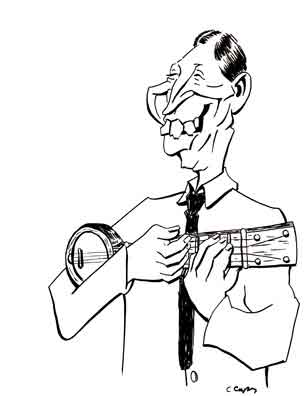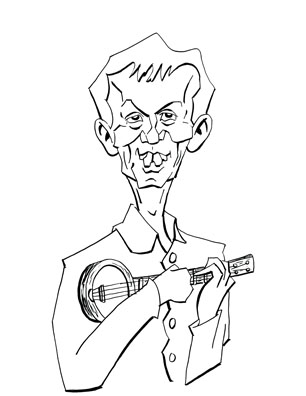Geroge Formby
Musical Genius from Lancashire

George Formby
Is it us or him?
Around 1887, a twelve year old kid named James Booth Lawler was living on the streets in Northern England. He survived from handouts scrounged from the local bakers and would take shelter in the then popular music halls until the managers found him and kicked him out. But he loved watching the performers who actually made a living - if not a great living - by performing on a stage.
James decided to try singing himself and found if he stood on a corner and sang, then people would toss him some pennies and the occasional bob. His voice - a high clear tenor - was good enough so he was able to land jobs performing in the local music halls He took the stage name George Formby and in 1897, he married Martha Maria Salter who was also a music hall singer. In 1902 they had a son they named George.
Martha became an extremely astute manager for her husband and eventually James's salaries ranged from £300 to £700 a week. At the then exchange rate that was $1500 to $3500 a week - equivalent to $40,000 to $90,000 today. So despite the later picture of the younger George coming out of the working class Lancashire, George grew up in quite comfortable surroundings.
It's an old story, but the father did not want his son to follow in his theatrical footsteps. Instead at the tender age of seven, George started to train as a jockey. James's intentions were good. After George gained experience, James intended to get out of the performing business, and he and George would focus entirely on raising and racing the horses, with George eventually taking the business over on his own. But because of these plans, George never finished his schooling beyond the elementary levels, and he always lamented he never learned to read or write properly.
But James died in 1921 when George was only 16, and the horse racing business plans died with him. But George had a voice was remarkably like his father, and he decided to try performing. With the help from one of his dad's friend, Fred Harrison, George landed a stage job, but it wasn't smooth sailing, partly because he used another name, not wanting to unfairly cash in on his Dad's fame. Then in 1923, he met his future wife, Beryl Ingham, and they married in 1924. Beryl, like Martha did for George's dad, took over as a manager and soon she helped to get George a five year contract in one of the leading music halls. After that George said he (and Beryl) never looked back.
This was also the pioneering era of motion pictures, and George and a friend named Arthur Mertz tried to get the London producers interested in making a film that George had scripted. Rebuffed George returned the the north and was playing in Warrington when a small film producer named Johnny Blakely heard him sing. Johnny approached George and said they should make a film together. But, Johnny added, he didn't have a story. Well, George handed over his script and they shot the film called "Boot's Boots" in two weeks at a cost of £3000. But none of the major distributors were interested.

George Formby
Is it us or him?
Johnny did manage to get the film some time at local theaters, and the show did well. Then Basil Dean, one of the major English film producers, was making a trip around the country. The idea was for Basil to find what the theater owners thought would sell. He was perplexed when the owners kept telling him they wanted someone named George Formby. He was even more surprised to see long lines in the theaters showing George's film. After tracking George down, Basil signed George to a seven year contract. By his count, George eventually made 22 movies, all of which were successes.
George became one of the highest paid and popular comedians and singers in England. In his films George inevitably played the innocent fish-out-of-water with the occasional song thrown in. All his life George credited his success to Beryl. But she was also extremely jealous of the actresses who starred with George which seems to have presented some difficulties since all movies, then as now, did best when there was some love interest. But George's real fame came from his singing and playing the banjo ukelele, an instrument on which George was quite accomplished.
Although he received credit for many of the songs he sang, he actually wrote very few on his own. The credit was largely at the insistence of Beryl so they could get extra income. George did contribute to the lyrics which were noted for their double entredres and suggestivity.
The blushing bride she looks divine.
The bridegroom he is doing fine.
I'd rather have his job than mine,
When I'm cleaning windows.
Not so bad, really. But compare those rather mild and only slightly saucy lyrics to the much more suggestive chorus from I Wonder Who's Under Her Balcony Now?.
I wonder who's under her balcony now?
Who's kissing my girl?
Will he kiss her under the nose,
Or underneath the archway where the Sweet William grows?
Whoa!
One of the reasons George got away with singing such lyrics is he never gave a hint that there was a double meaning. Frank Skinner, the British singer and comedian and who is an expert on George and his life, even wondered whether the response to the songs was more to do with us than with George and his times. Well, that didn't really matter to the BBC who occasionally took umbrage with the lyrics and issued a memo saying George couldn't sing some of the songs - or at least he had to modify them to meet propriety. George was well aware his songs created a bit of a problem in that less permissive era and would tailor his lyrics to fit the BBC's scruples. On the other hand when called to perform for the Royal Family, the Queen Mother insisted he sing all the lyrics - and sometimes she asked him to sing a song more than once.
After World War II, George's popularity dropped off but he continued performing and even had a special show in 1960 on the BBC. But yes, he had to cut out some of the verses from When I'm Cleaning Windows (whose real title is the Window Cleaner), and he didn't even try to sing I Wonder Who's Under Her Balcony Now. But it was a nice program, and George died less than a year after the show was broadcast.
References
George Formby, http://www.georgeformby.org/. Lots of stuff on George and most of the information on George's early life (and that of his father) is found here.
"Frank Skinner on George Formby", BBC 4, 2011. Great introduction to George Formby and his many (and present) fans. Really nice spot of an Oxford music graduate fan of George's whose degree was specializing in the ukelele. Frank, of course, plays the ukelele in the style of George.
"The Friday Show", BBC, 1960. George's retrospective on his life and songs.